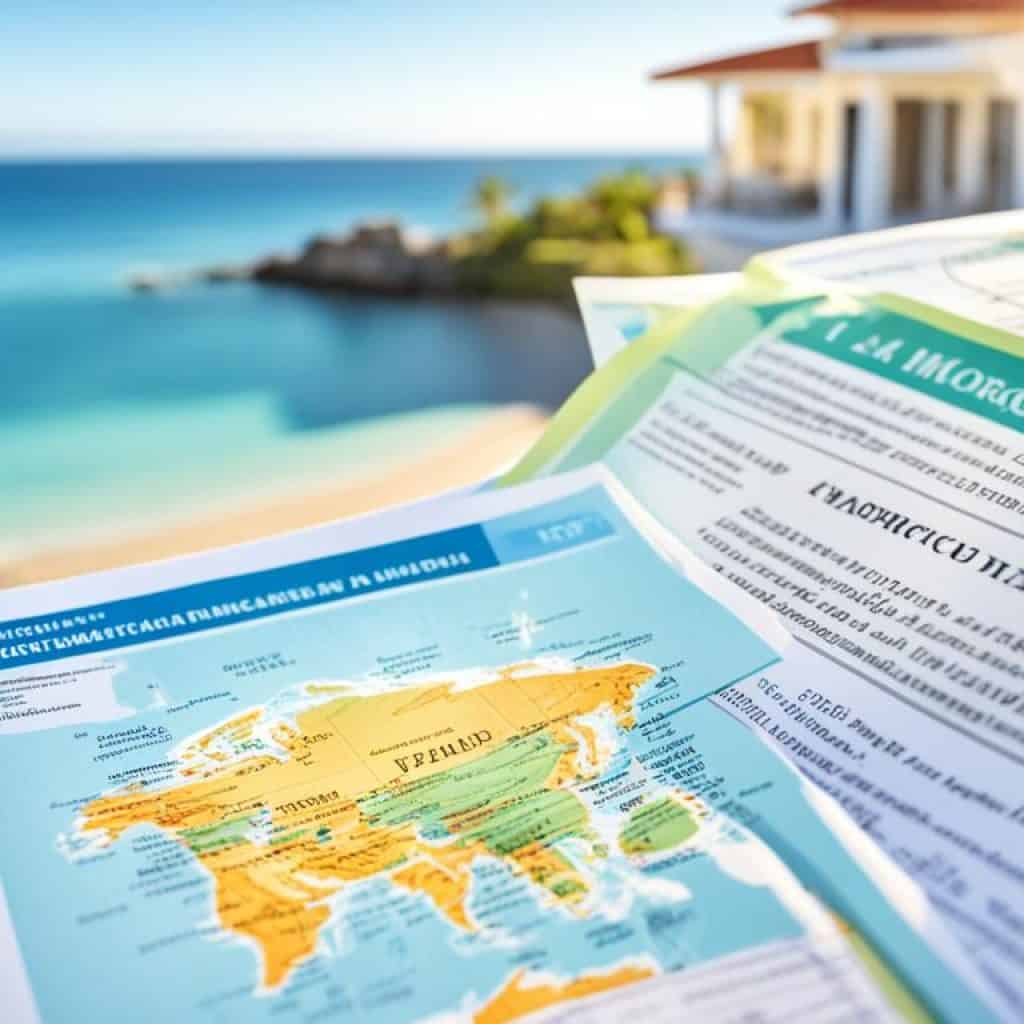Are you an expat dreaming of owning a home in another country? Or maybe you’re a foreigner looking to buy property in a new land? Whatever your situation, navigating the world of expat mortgages can be a daunting task. But fear not! Our comprehensive guide is here to help you understand expat mortgages, explore your options, and make informed decisions.
From international mortgages to mortgage for expats, we will break down everything you need to know about overseas mortgages. We’ll uncover the benefits of using an international mortgage provider and delve into the deposit requirements for buying property abroad. So, if you’ve ever wondered how to arrange an expat mortgage in your home country or in the country of purchase, this guide is your ultimate resource.
But first, let’s dispel some common beliefs. Are expat mortgages only for the wealthy? Are they too complicated for the average person? We’re here to challenge those misconceptions and show you that expat mortgages are within reach. So, are you ready to embark on your property ownership journey?
Key Takeaways:
- Expat mortgages provide opportunities for individuals to purchase property abroad or retain UK properties while living overseas.
- Understanding the different types of mortgages available and deposit requirements is crucial for making informed decisions.
- Seeking guidance from specialist mortgage brokers and international lenders can help expats find tailored mortgage solutions.
- Don’t let common misconceptions deter youâexpat mortgages are attainable for a wide range of individuals.
- Stay tuned to explore the ins and outs of expat mortgages and discover how you can turn your property ownership dreams into reality.
Now that we’ve piqued your curiosity, let’s dive into the world of expat mortgages and uncover the possibilities that await you.
What is an Overseas Mortgage?
An overseas mortgage is a mortgage on a property outside the country where you live. It provides an opportunity for individuals to purchase property outside their home country or for expats to buy property in their country of residence.
Buying property outside the country can be an exciting venture, whether it’s for investment purposes, a vacation home, or a permanent residence. However, financing such a purchase can be challenging without the right resources and guidance.
If you’re an expat looking to buy property abroad, you can choose to get an overseas mortgage from your home country or the country where you are buying. Each option has its own advantages and considerations.
If you decide to get an overseas mortgage from your home country, you can benefit from access to financial advisers who understand international applications. Additionally, having your credit report accessible can streamline the application process.
On the other hand, getting a mortgage as a foreigner in the country where you want to buy can provide extra insight into the local real estate market. Local lenders may offer lower interest rates and better deals tailored specifically to the country’s property market.
Example: An expat living in the United States may choose to get an overseas mortgage from a U.S. lender for a property in Spain. They can leverage the knowledge and expertise of financial advisers experienced in arranging mortgages for overseas properties, while also benefiting from competitive rates offered specifically for Spanish properties.
Ultimately, the decision of whether to arrange an overseas mortgage in your home country or the country of purchase depends on your individual circumstances and preferences. It’s crucial to consider factors such as the availability of lenders, interest rates, and the expertise of financial advisers.
Now, let’s take a closer look at the process of arranging an overseas mortgage in your home country and the country where you want to buy, as well as the deposit requirements for buying property abroad.
| Option | Advantages | Considerations |
|---|---|---|
| Arranging an Overseas Mortgage in Your Home Country |
| |
| Arranging an Overseas Mortgage in the Country of Purchase |
|
Now that you have a better understanding of what an overseas mortgage entails, let’s dive deeper into arranging an overseas mortgage in your home country and the country where you want to buy.
Arranging an Overseas Mortgage in Your Home Country
Arranging an overseas mortgage in your home country is a viable option that offers several advantages. If you can find a lender that specializes in international services and provides mortgages for the country where you want to buy, you can benefit from familiar processes and guidance from financial advisers who understand the intricacies of overseas applications.
- Financial advisers can provide valuable insights into taxes, exchange rates, and insurance requirements, helping you make informed decisions.
- Working with a lender in your home country can prevent any translation issues or fees that may arise when dealing with foreign institutions.
- If you already own a property in your home country, you may have the option to remortgage it. By releasing equity from your existing property, you can use the funds to finance your overseas purchase. This approach may allow you to avoid larger deposit requirements and potentially secure more favorable interest rates.
Before committing to an overseas mortgage, it is crucial to assess your financial situation and ensure that you can comfortably afford the repayments. Consult with a qualified financial adviser who can help you evaluate your options and provide personalized guidance.
Additionally, consider securing a loan against savings or other financial assets denominated in a different currency to hedge against exchange rate fluctuations. This strategy can help protect you from potential currency volatility and provide greater stability when making your mortgage repayments.
Image: Property keys representing the process of arranging an overseas mortgage
Arranging an Overseas Mortgage in the Country of Purchase
When it comes to buying property abroad, arranging an overseas mortgage in the country of purchase can offer unique advantages. Local lenders and mortgage brokers have valuable insights into the best mortgage deals available in that specific country, ensuring you make informed decisions. However, as a foreigner, obtaining a mortgage in a different country may present challenges, potentially leading to higher interest rates.
Before proceeding, it is vital to familiarize yourself with the regulations, taxes, laws, and insurance requirements in the country where you plan to purchase property. Each country has its own set of rules and processes, and understanding them is crucial for a smooth mortgage application process and a successful property purchase.
For those who are not familiar with the official language or legal processes in the country, it is highly recommended to seek the assistance of an independent lawyer and translator. An independent lawyer can help navigate through local regulations, review contracts, and ensure compliance with all legal requirements. Similarly, an independent translator can assist in understanding all the documents and communications throughout the process.
It’s also worth noting that if you opt for an overseas lender, your mortgage repayments may be in foreign currency. While this can be convenient if you earn income in that currency, it’s essential to consider the potential impact of foreign exchange fluctuations on your mortgage. Consulting with a knowledgeable financial advisor can provide valuable insights and guidance on managing the risks associated with foreign currency mortgages.

Overview of Arranging an Overseas Mortgage in the Country of Purchase
| Pros | Cons |
|---|---|
| Access to local lenders and mortgage brokers with in-depth knowledge of the country’s property market | Potential challenges for foreigners, including higher interest rates and stringent eligibility criteria |
| Opportunity to benefit from country-specific mortgage products and tailored solutions | Understanding and complying with local regulations, taxes, laws, and insurance requirements |
| Assistance from an independent lawyer and translator to navigate through legal processes | Potential exposure to exchange rate fluctuations when repaying the mortgage |
Arranging an overseas mortgage in the country of purchase requires careful consideration and thorough understanding of the specific market and legal landscape. Seeking professional guidance and collaborating with experienced professionals can greatly simplify the process and increase the chances of a successful overseas property purchase.
Can You Get Buy-to-Let Mortgages Abroad?
When it comes to investing in overseas property, many people wonder if it’s possible to get buy-to-let mortgages. The answer, however, depends on the laws and regulations of the country where you want to buy. While some countries have no limits on the number or type of properties foreigners can buy to let, others have restrictions in place.
For example, in Canada, there are no property ownership limits for foreigners, making it a popular destination for buy-to-let investments. On the other hand, countries like China typically allow foreigners to own only one property, which they must live in themselves.
To give you a better idea of the possibilities, let’s take a look at some popular countries for buy-to-let investments:
| Country | Property Ownership Limits |
|---|---|
| United States | No restrictions on property ownership |
| United Kingdom | No restrictions on property ownership |
| France | No restrictions on property ownership |
| Turkey | No restrictions on property ownership |
| Poland | No restrictions on property ownership |
As you can see, there are several countries where foreign investors can freely own and let properties without facing any ownership limitations. These countries offer potential for attractive returns on investment and long-term growth.
Before considering a buy-to-let investment abroad, make sure to research the laws and regulations in the specific country you’re interested in. Understanding property ownership limits and any legal requirements will help you make informed decisions and avoid any potential complications.
In addition, seeking guidance from local experts, such as real estate agents or property lawyers, can provide valuable insights and ensure you comply with all necessary regulations.
Remember, investing in buy-to-let properties abroad can be a lucrative opportunity, but it’s essential to conduct thorough research and seek professional advice to make informed decisions.
Deposits for Buying Property Abroad
One of the key considerations when buying property abroad is the deposit required. The deposit amount can vary depending on the country and specific circumstances. Typically, deposits range from 15% to 50% of the property’s value outside your home country. However, it’s important to note that the deposit requirement may be influenced by factors such as your financial situation and responsibilities.
When determining the deposit amount, it’s essential to consider your own financial capabilities and consult with experts who can provide guidance based on your specific situation. Understanding the deposit requirements is crucial to ensure that you are financially prepared for your international property purchase.
To give you a clearer understanding, here’s an example table outlining the minimum deposits for buying property in popular countries:
| Country | Minimum Deposit |
|---|---|
| United States | 20-30% |
| Spain | 20-30% |
| France | 15-25% |
| Australia | 20-30% |
| United Arab Emirates | 25-40% |
Please note that the table above is for illustrative purposes only and the actual deposit requirement may vary. It is advisable to consult with a professional to get accurate and up-to-date information regarding deposit requirements in your desired country.
Getting an Overseas Mortgage as a UK Expat
Many UK expats dream of owning property in the UK, even while living abroad. However, securing an overseas mortgage as a UK expat can present some challenges. Banks are often not equipped to handle the unique needs of overseas borrowers, making it harder for expats to fulfill the credit history verification typically required by lenders. Fortunately, specialist mortgage brokers can assist expats in finding reliable and competitive lenders who offer suitable mortgage products for British expatriates.
When it comes to purchasing property in the UK as an expat, there are some special considerations to keep in mind. The process may require additional paperwork and documentation, and the eligibility criteria can vary depending on the lender. It’s crucial for UK expats to work with mortgage brokers who have expertise in securing overseas mortgages, as they can guide them through the process and help them find the best financing options.
One important consideration for UK expats is the exchange rate fluctuation. Since expats typically earn and hold their assets in a different currency, they need to carefully consider how changes in exchange rates can impact their mortgage payments and overall financial stability. Working with a qualified financial advisor who understands the complexities of exchange rates and can provide guidance is essential to ensure a sound financial strategy.
| Special Considerations for UK Engpats | Benefits of Specialist Mortgage Brokers |
|---|---|
|
|
Securing an overseas mortgage as a UK expat may have its challenges, but with the right support and guidance, it is entirely achievable. By working with specialist mortgage brokers who understand the unique needs of expats, UK residents living abroad can fulfill their dream of owning property in the UK.

Best Expat Mortgages for UK Property
When it comes to purchasing UK property as an expat, there are two main types of mortgages to consider: residential mortgages and buy-to-let mortgages. Understanding the differences and knowing the available options can help expats make informed decisions that align with their financial goals and circumstances.
Residential Mortgages:
Residential mortgages are intended for expats returning to the UK who want to purchase a property as their primary residence. These mortgages are regulated by the Financial Conduct Authority, offering consumer rights protection. However, not all lenders offer expat residential mortgages, making it important to explore different options and find a lender who caters specifically to expats’ needs.
Buy-to-Let Mortgages:
Buy-to-let mortgages are an excellent choice for expats aiming to generate rental income from their UK property. Unlike residential mortgages, buy-to-let mortgages are not subject to the same regulation, allowing for a broader range of lenders to offer competitive options. Expats can enjoy the financial benefits of investing in the UK property market while residing overseas.
Whether considering a residential mortgage or a buy-to-let mortgage, it is crucial to partner with reputable and knowledgeable mortgage providers who specialize in serving expats. These providers understand the unique challenges and circumstances that expats face, ensuring a seamless and tailored experience.
In summary, expat mortgages for UK property offer opportunities for both residential and investment purposes. Understanding the differences between residential and buy-to-let mortgages enables expats to make well-informed decisions based on their specific needs and objectives.
Applying for Expat Mortgages
Obtaining an expat mortgage can be a more challenging process for individuals living abroad, as there are specific requirements that need to be met. Some of the key considerations include credit history, having a UK address, and demonstrating reliable income. Banks typically require evidence of financial responsibility, which includes a solid credit history and the ability to provide a UK address.
Building a UK credit history as an expat can be achieved through various means. Keeping a line of credit open in the UK and ensuring timely payments and responsible credit management can help establish a positive credit profile. Another option is to register on the electoral roll, as it provides verification of a UK address. Additionally, renting a property in the UK before purchasing can also help establish a UK address.
Key Requirements for Expat Mortgages:
- Credit history: Demonstrate financial responsibility by maintaining a good credit history.
- UK address: Provide a verifiable UK address to meet lender requirements.
- Reliable income: Show evidence of a reliable and sustainable income source.
- Verification: Be able to verify personal and financial information as required by lenders.
- Obtaining a UK mortgage: Fulfill the specific criteria set by UK mortgage providers.
By meeting these requirements, expats can enhance their chances of obtaining a UK mortgage and securing their desired property. Building a strong financial foundation and fostering a positive credit history are essential steps towards achieving this goal.
“The opportunity to own property in the UK as an expat is within reach. By fulfilling the necessary requirements and establishing a solid financial standing, expat mortgages can offer pathways to realizing your dreams of property ownership.” – Financial Advisor
Do note that requirements may vary between lenders, and working with a qualified mortgage advisor can provide invaluable guidance throughout the mortgage application process.
Next, we will explore the specific mortgage options available in different countries, providing insights into the application process, mortgage types, and terms.
Mortgage Options in Specific Countries: Spain
If you’re considering buying property in Spain, understanding the mortgage options available is crucial. Spain offers a range of mortgage types, including variable rate, fixed-rate, and mixed-rate mortgages, providing flexibility to suit different financial situations and preferences.
One important requirement for obtaining a Spanish mortgage is the Número de Identificación de Extranjeros (NIE), which is a foreigner identification number. The NIE can be applied for while you are still in the UK, simplifying the application process.
Many banks in Spain lend to non-residents, making it accessible for international buyers. The application process can typically be initiated online or over the phone, ensuring convenience and efficiency.
Variable rate mortgages: These mortgages offer interest rates that can fluctuate over time, usually based on the Euribor rate. While they can provide potential savings if interest rates decrease, they also come with the risk of rates increasing.
Fixed-rate mortgages: With a fixed-rate mortgage, the interest remains unchanged for a set period of time, providing stability and predictability in your monthly repayments. This can be advantageous during times of economic uncertainty.
Mixed-rate mortgages: A mixed-rate mortgage combines elements of both variable and fixed-rate mortgages. The interest rate is fixed for an initial period and then switches to a variable rate, offering a balance between stability and potential savings.
The average mortgage term in Spain is typically between 20-25 years, depending on the borrower’s age and financial circumstances. This provides borrowers with flexibility in choosing a repayment period that aligns with their long-term plans and financial capabilities.
| Mortgage Type | Description |
|---|---|
| Variable rate mortgage | Interest rates fluctuate based on market conditions |
| Fixed-rate mortgage | Interest rate remains unchanged for a set period |
| Mixed-rate mortgage | Combination of fixed and variable interest rates |
| Average mortgage term | 20-25 years (varies based on borrower’s age) |
When considering a Spanish mortgage, it’s essential to conduct thorough research, compare offers from different lenders, and seek professional advice to ensure you choose the best option for your needs. With the right mortgage in place, you can confidently make your dream of owning property in Spain a reality.

Mortgage Options in Specific Countries: France
Getting a French mortgage as a foreigner is possible, opening up opportunities for owning property in this beautiful country. However, it is important to note that specific requirements may vary among French banks.
When it comes to the loan amount, most banks in France offer mortgages that range from 70% to 85% of the property value. Non-EU applicants may need a larger deposit, so it is crucial to consider this factor when planning your budget.
Fixed-rate loans are the most common mortgage type in France. With terms typically ranging from 6 to 25 years, this option allows borrowers to lock in a stable interest rate, providing predictability and peace of mind throughout the repayment period.
For borrowers seeking flexibility, there are also options for flexible mortgages. With these mortgages, borrowers can vary their monthly payments, providing a level of adaptability to their financial situations.
Investors looking for options tailored to their specific needs can opt for interest-only mortgages, allowing them to focus on maximizing their returns. With an interest-only mortgage, borrowers only pay the interest portion of the loan, freeing up additional funds for other investment opportunities.
Variable-rate mortgages in France can depend on Euriobor rates plus a margin. It is important to carefully consider the risks and potential fluctuations associated with this type of mortgage when making your decision.
If you prefer a more stable interest rate, capped-rate mortgages are available in France. These mortgages have a limit on interest rates for part or all of the repayment term, providing borrowers with a level of protection against potential interest rate increases.
To summarize, French mortgages offer a range of options to suit different needs and preferences. Whether you’re seeking stability, flexibility, or optimized returns, there’s a mortgage type available for you in France.
| Mortgage Type | Loan Amount | Term Length | Special Features |
|---|---|---|---|
| Fixed-Rate | 70-85% of the property value | 6-25 years | Stable interest rate |
| Flexible | 70-85% of the property value | 6-25 years | Vary monthly payments |
| Interest-Only | 70-85% of the property value | 6-25 years | Focus on maximizing returns |
| Variable-Rate | 70-85% of the property value | 6-25 years | Based on Euriobor rates |
| Capped-Rate | 70-85% of the property value | 6-25 years | Limit on interest rates |
Expat Mortgage Guide: Buying UK Property as an Expat
Buying UK property as an expat can be an exciting and rewarding endeavor. However, it involves some additional considerations compared to purchasing property in your home country. As an expat, you may face difficulties in securing an overseas mortgage and need to navigate foreign exchange rates. To ensure a smooth and successful transaction, it is crucial to seek guidance from a qualified financial advisor who specializes in expat mortgages.
- Researching and understanding the extra factors involved in buying property as a UK expat is essential. These factors may include differences in the mortgage application process, eligibility requirements, and legal considerations.
- One of the significant challenges you may encounter is securing an overseas mortgage. Many UK lenders are not set up to accommodate overseas borrowers, making it harder for expats to access credit history verification typically required by lenders.
- Another crucial aspect to consider is the impact of foreign exchange rates. As an expat, you will need to exchange your funds from the local currency to pounds sterling to complete the purchase. Fluctuations in exchange rates can significantly influence the overall cost of your property.
By working with a qualified financial advisor, you can gain valuable insights into the negotiation process and overcome these challenges:
- The negotiation process may involve factors unique to the UK property market. It’s important to familiarize yourself with UK property laws, regulations, and market trends to make informed decisions.
- A qualified financial advisor can help you assess your financial situation, determine your budget, and understand the available mortgage options for UK property. They can guide you through the application process and assist in finding lenders who specialize in expat mortgages.
- Negotiating the terms of your mortgage, including interest rates and repayment terms, requires a thorough understanding of the UK mortgage market. Your financial advisor can provide you with the necessary expertise to negotiate favorable terms and ensure you secure the best mortgage deal.
Remember, buying UK property as an expat is a complex process, and the guidance of a qualified financial advisor is invaluable. They can help you navigate the intricacies of arranging an overseas mortgage and provide you with comprehensive support throughout the entire transaction.
Quote: “Working with a qualified financial advisor who specializes in expat mortgages can make the process of buying UK property as an expat much smoother and less daunting.” – Jane Smith, expat homeowner
Having the right guidance and expertise will give you the confidence to make informed decisions and ensure a successful purchase of UK property as an expat.
Conclusion
In conclusion, expat mortgages offer a wealth of opportunities for individuals who aspire to purchase property abroad or retain their UK properties while living overseas. The process of arranging an overseas mortgage involves careful consideration of available options in both the home country and the country of purchase. It is crucial to assess deposit requirements and gain a comprehensive understanding of the various types of mortgages available.
Although there may be challenges along the way, it is important to remember that specialist mortgage brokers and international lenders are dedicated to assisting expats in finding the best mortgage solutions tailored to their unique needs. Seeking professional advice is highly recommended to navigate the specific requirements of each country and make informed decisions.
Whether you are looking to invest in a dream property abroad or maintain ownership of your UK residence, expat mortgages can make your aspirations a reality. With the guidance of experienced professionals, you can navigate the complexities of the mortgage process and secure the best financing options for your circumstances. Take advantage of the opportunities that expat mortgages offer and embark on your journey of property ownership, wherever your dreams may lead you.
FAQ
What is an Overseas Mortgage?
An overseas mortgage is a mortgage on a property outside the country where you live. It can be arranged with a lender in your home country or in the country where you’re buying.
How can I arrange an Overseas Mortgage in my Home Country?
You can arrange an overseas mortgage in your home country by finding a lender that offers international services and has a mortgage offering in the country where you want to buy.
How can I arrange an Overseas Mortgage in the Country of Purchase?
To arrange an overseas mortgage in the country of purchase, you can work with lenders and mortgage brokers who have expertise and insights into the best deals available and can guide you through the process.
Can I get Buy-to-Let Mortgages Abroad?
Whether you can get buy-to-let mortgages abroad depends on the laws and regulations of the specific country where you want to buy. Some countries have no limits on the number or type of properties foreigners can buy to let, while others have restrictions.
What are the deposit requirements for buying property abroad?
The deposit required for buying property abroad varies depending on the country, typically ranging from 15% to 50% outside your home country. Factors such as your financial situation and responsibilities will also impact the deposit amount.
Can UK expats secure an overseas mortgage for UK property?
Securing an overseas mortgage as a UK expat can be more challenging, but it is possible. Specialist mortgage brokers can assist UK expats in finding reliable lenders who offer suitable mortgage products for British expatriates.
What are the options for expat mortgages for UK property?
Expat mortgages for UK property can be divided into two main types: residential mortgages for expats returning to the UK and buy-to-let mortgages for expats who want to retain a UK property as an investment or future residence.
What are the requirements for expat mortgages?
Meeting the requirements for expat mortgages can be more challenging due to factors such as credit history and having a UK address. It is important to have a reliable income, a good credit history, and a UK address to increase your chances of approval.
What are the mortgage options in specific countries like Spain?
In Spain, obtaining a Spanish mortgage requires a Número de Identificación de Extranjeros (NIE). Many banks lend to non-residents, and you can initiate the application process online or over the phone. Variable and fixed-rate mortgages are common, with the average mortgage term being 20-25 years.
What are the mortgage options in specific countries like France?
In France, most banks loan 70-85% of the property value, with non-EU applicants potentially needing a larger deposit. Fixed-rate loans are the most common mortgage type, with terms typically ranging from 6 to 25 years. Flexible mortgages, interest-only mortgages, and capped-rate mortgages are also available.
What should UK expats consider when buying UK property?
Buying UK property as an expat requires considering difficulties in securing an overseas mortgage and accommodating foreign exchange rates. Seeking guidance from qualified financial advisors is crucial to navigate the complexities and ensure a smoother transaction.


















Add comment